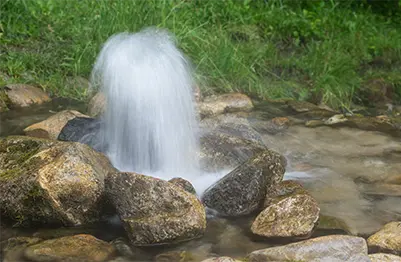

Water Analysis
Borehole water comes straight from underground sources and isn’t treated like mains water, so testing is essential for peace of mind and compliance with the drinking water standards.
About
Water Analysis for Borehole Water
If you’re considering a private borehole or water well, water analysis is a crucial step to guarantee your water is safe to drink.
On this page, we explain why borehole water analysis is necessary, how the testing process works, and the benefits of regular water testing. We’ll also highlight the risks of not testing, advise how often to test borehole water for homes and businesses, and answer frequently asked questions.
By the end, you’ll see why Igne is the expert partner you need for reliable water analysis and treatment!
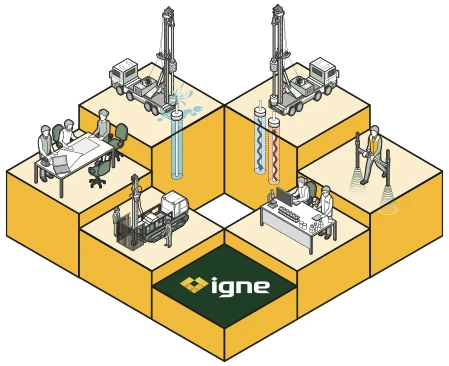
Standards Complience
Why Is Water Analysis Necessary for Borehole Water?
Borehole water often looks clear and pure, but appearances can be deceiving. Water analysis is necessary to identify any hidden contaminants and ensure the water is truly safe and potable (fit for drinking). Unlike treated mains water, private well or borehole water can contain various natural or man-made impurities picked up underground.
Common contaminants include bacteria (such as E. coli and coliforms from faecal matter), nitrates from agricultural fertilisers, and pesticides seeping in from surrounding soil. Trace metals like iron, manganese, or even arsenic can dissolve from rocks into the groundwater.
While many of these substances are invisible and tasteless, they can pose health risks if above safe limits. By testing your borehole water in a laboratory, you’ll know exactly what’s in your water. This is the only way to confirm that your supply meets UK drinking water standards and is safe for you and your family to use every day.
In short, water analysis gives you confidence that your borehole water is clean, healthy and free of any unpleasant surprises.
The Process
The Borehole Water Analysis Process – From Testing to Treatment
Understanding what’s in your water requires a thorough, professional testing process. Igne’s expert team follows a comprehensive water analysis procedure for borehole supplies:
On-site assessment
We often begin with an on-site visit to assess your borehole and surrounding area. This includes checking the wellhead protection, looking for potential sources of contamination nearby (such as septic tanks, farmland or industrial sites), and observing any odour, colour, or sediment in the water. Basic field tests may be done, like measuring pH or conductivity, to get an initial picture of water quality. This site assessment helps us collect water samples properly and safely.
Laboratory testing
The core of borehole water analysis is detailed laboratory testing. Igne will take a water sample (or multiple samples) from your tap or borehole pump output, following strict sampling protocols to avoid any contamination. The samples are then sent to an accredited laboratory for a full suite of tests. These include microbiological analysis for harmful bacteria (like E. coli and total coliforms) and chemical analysis for minerals, metals and other parameters. Typical lab tests cover: bacterial counts, nitrates and nitrites, pH level, hardness (calcium and magnesium), iron and manganese content, sulphate, chloride, lead, arsenic, and any other locally relevant contaminants.
The lab analysis will identify any substances present and compare their levels against safe drinking water standards. This scientific approach provides an accurate profile of your water quality.
Interpreting results and guidance
Once the laboratory results are in, our water experts interpret the findings for you in a clear, jargon-free manner. You’ll receive a report of the analysis results, and we’ll explain what each factor means for your water supply. If all parameters are within safe limits, you can have reassurance that your borehole water is fine to use. If any issues are detected - for example, high bacteria count or excessive iron - we will advise on the best course of action. This might involve implementing a water treatment solution to address the specific problem.
Tailored treatment solutions
A key reason to analyse your water is to guide effective treatment. Depending on the results, Igne can design a treatment programme to make your borehole water safe and pleasant to use. For instance, if bacterial contamination is found, we may recommend installing a UV sterilisation system or chlorination unit to disinfect the water. If tests show hard water or iron staining, we could fit water softeners or iron removal filters. High nitrate levels can be treated with specialised filtration (such as ion-exchange or reverse osmosis).
Whatever the issue, our team will tailor a solution so that your water meets all health standards and your specific needs. Importantly, we only suggest treatments that are truly needed, saving you from spending on unnecessary equipment by basing decisions on solid test data.
By following this rigorous process of analysis, Igne ensures any treatment is targeted and effective. Testing and treatment go hand-in-hand: proper water analysis upfront means you get the right fix for any water quality concerns, first time around. And after treatment is installed, we can re-test the water to verify everything is working and your water is crystal clean.
The Benefits
Benefits of Thorough Water Testing for Your Borehole
Regular and thorough borehole water testing offers many benefits for private water supply owners. By having your water analysed, you can protect your health because you ensure there are no harmful bacteria or toxins in your water that could cause illness. Early detection of contaminants like E. coli, nitrates or lead means you can address them before they affect anyone’s health.
Verifying that your water meets Drinking Water Regulations and UK safety standards is especially important if you supply water to others (tenants, employees or customers) – compliance avoids legal issues and guarantees water is fit for consumption.
Another benefit is you can identify issues that impact taste, smell, or appearance. Testing can explain any metallic taste, rotten-egg odour, or discoloration (often caused by iron, hydrogen sulphide, etc.) so you can treat it and enjoy fresh, clean water.
Analysis allows you to discover if your water is corrosive or high in minerals. For example, very hard water can fur up heating systems and kettles with scale, and low pH (acidic water) can corrode pipes. Testing alerts you to these conditions so you can prevent damage to your borehole pump, pipework and appliances by installing appropriate treatment (like a softener or pH correction filter).
By knowing exactly what treatment is (or isn’t) needed, you avoid spending on unnecessary or wrong equipment. Proper analysis leads to targeted solutions, which are more cost-effective in the long run. It also helps your borehole system run efficiently with fewer breakdowns or surprises.
Perhaps most importantly, comprehensive water analysis gives you peace of mind. You can use your borehole water with confidence, knowing you’ve left no stone unturned in checking its quality. Whether it’s for drinking, cooking, bathing or farming, you’ll have complete assurance that your water is clean and safe thanks to Igne’s thorough testing.
Eliminate Risks
Risks of Neglecting Water Analysis
What if you skip testing your borehole water? Failing to carry out water analysis can lead to serious risks and problems, including:
Health hazards
Undiscovered contamination can expose anyone using the water to bacteria, parasites or chemicals. For example, drinking water with E. coli or other pathogens can cause severe gastrointestinal illness. High nitrate levels can be dangerous for infants, and prolonged exposure to contaminants like arsenic can have chronic health effects. Without testing, you won’t know something is wrong until people get sick.
Non-compliance
If your borehole is used for a business, farm, or rental property, you have a legal duty to provide safe water. Not testing means you could unknowingly breach drinking water standards or local regulations, leading to potential fines or enforcement action. Even for a single household, not meeting safety guidelines puts you at risk when authorities or lenders require water quality proof.
Equipment damage & costs
Water that contains unseen sediment, minerals, or aggressive chemistry can damage your borehole infrastructure over time. Sediment or iron buildup can clog filters and foul pumps. Hard water scale can reduce the efficiency of water heaters and appliances. Corrosive water might eat away at metal pipes and fittings. These issues can lead to costly repairs or reduced lifespan of your equipment. Regular analysis helps catch water chemistry problems early, allowing you to protect your borehole system with proper treatment.
Bad taste & odour
If you neglect testing, you might put up with unpleasant water when you don’t have to. Many odour or taste problems (like sulphur smells or metallic tang) can be resolved once you identify the cause through analysis. Ignoring testing means living with subpar water quality unnecessarily.
False security
Groundwater can change over time. You may assume your water is fine because it was OK in the past, but without periodic testing you could miss new contamination. Land use changes, agriculture, or natural shifts can introduce pollutants gradually. Skipping analysis gives a false sense of security and leaves you blind to emerging issues in your water supply.
In summary, neglecting water analysis for your borehole can compromise health, lead to compliance troubles, and result in avoidable damages and costs. It’s far better to invest in regular testing and stay safe than to face the consequences of bad water later.
Frequency
How Often Should Borehole Water Be Tested?
Domestic (home) borehole users: for private domestic wells and boreholes
It’s recommended to test your water at least once a year. Annual testing will check for key indicators like bacterial contamination and nitrate levels to ensure your water remains safe.
In practice, many homeowners do a comprehensive lab test annually, especially if the water is used for drinking and cooking. You should also consider testing whenever something changes with your water – for example, if it suddenly develops an odd taste, smell or colour, or if there has been heavy rainfall, flooding or nearby agricultural activity that could affect the groundwater.
It’s wise to test a new borehole supply when it’s first commissioned, so you have a baseline for its water quality. Additionally, if you have vulnerable individuals in your household (such as young children, pregnant women, or elderly family members), more frequent testing (e.g. every 6 months) provides extra reassurance that the water remains potable for them.
Commercial or shared water supplies
Ifyour borehole water is used in a commercial setting or supplied to the public (for instance, a farm shop, holiday cottages, a campsite, or multiple homes on one supply), you should test it at least annually – and often more frequently is advisable.
In the UK, private water supplies that serve businesses or a group of homes are subject to the Private Water Supplies Regulations. Local authorities will typically carry out a risk assessment on such supplies every five years and may conduct their own testing on a set schedule. However, as the owner or operator, you shouldn’t rely solely on infrequent official tests. Best practice is to have your own regular water testing programme in place. Many commercial or small public water supplies test their borehole water every 6 or 12 months for a full suite of parameters, and even quarterly for critical ones like bacteria.
Regular monitoring is especially important for businesses because it protects your customers and employees and ensures you remain compliant with health standards at all times.
Remember that consistent water quality is key – testing helps you maintain it by catching any issues early and confirming that your treatment systems (if in place) are working effectively.
Note: Water quality can change, so whatever the use, make sure to test promptly if you suspect any contamination or after any event that might impact your well (for example, nearby construction, chemical spills, or if someone gets ill without obvious cause). Both domestic and commercial users should keep records of test results over time, this helps track trends and provides evidence of due diligence.
By testing on a sensible schedule, you’ll keep your borehole water supply safe, reliable, and in good condition.
FAQ
Frequently Asked Questions About Borehole Water Analysis
- Is borehole water safe to drink?
Borehole water can be perfectly safe to drink provided it’s properly tested and treated as needed. Many people in the UK enjoy clean drinking water from private wells or boreholes. However, because this water isn’t pre-treated by the water company, you must confirm its safety through analysis. Testing will reveal if any bacteria, chemicals, or other contaminants are present. Often, simple treatment measures (like filtration or UV disinfection) can resolve any issues found. It’s not wise to assume borehole water is safe without testing, once your water is professionally analysed and any required treatment is installed, you can confidently use it for drinking, cooking, and bathing.
- What does a borehole water analysis test for?
A comprehensive borehole water analysis will test for a wide range of water quality parameters. This typically includes microbiological tests for bacteria (e.g. E. coli and coliform bacteria) which indicate faecal contamination; general sanitary indicators like total colony count; and chemical tests for various substances.
Key chemical parameters checked often include nitrates/nitrites (from fertiliser runoff), ammonium, pH level, hardness (calcium and magnesium), iron and manganese (common natural minerals that can cause staining), chloride, sulphate, sodium, potassium, and heavy metals such as lead, arsenic or cadmium.
The analysis might also cover organic contaminants or pesticides if these are a concern in your area. In short, the lab will screen your water against all the main contaminants listed in drinking water standards. Igne will advise on the appropriate test package for your situation – ensuring nothing important is missed. The result is a full report on what’s in your water and whether each item is within safe limits.
- How do I get my borehole water tested?
Getting your borehole or well water tested is straightforward with Igne’s help. Simply contact Igne to arrange a water analysis for your private supply. We will typically come out to collect a water sample from your tap or borehole, using clean, sterilised bottles. (It’s important samples are taken correctly to get accurate results – our team are trained in proper sampling techniques.) The sample is then sent to an independent UKAS-accredited laboratory for analysis. After a short waiting period (usually a couple of weeks or less, depending on the tests), you’ll receive a detailed report of the findings.
We will explain the results to you in plain English and recommend next steps if any treatment is needed. Alternatively, if you prefer, we can provide a sampling kit and instructions for you to take a sample yourself, which we then collect or you send to the lab. Either way, the process is hassle-free for you – we handle the technical parts and ensure you get reliable, certified results.
Avoid using over-the-counter DIY test strips for anything beyond basic curiosity, as they are not as accurate or comprehensive as professional lab testing.
- How much does water analysis cost for a private well?
The cost of a borehole water test can vary depending on how many parameters are being analysed and the complexity of the testing required. A basic bacterial and chemical potability test might cost a few hundred pounds, whereas extensive testing for a broad spectrum of contaminants could be more. While there is a cost involved in laboratory analysis, think of it as an investment in your health and infrastructure - catching a problem early can save money by preventing illness or equipment damage down the line.
Igne offers competitive pricing for water analysis services and can provide a quote tailored to your needs. We’re happy to discuss which tests are appropriate for your borehole so you’re not paying for unnecessary analysis. In many cases, if you proceed with a recommended treatment solution through us, the initial testing fee may be partially credited.
Contact Igne for a transparent quote on testing your water; we strive to make safe water accessible and affordable.
- How often should I test my borehole water?
As mentioned above, private borehole water should be tested at least annually for most households, and more frequently for commercial or shared supplies. In general, a yearly water analysis is a good practice for a domestic well, this checks for any new contamination and verifies your water quality hasn’t changed.
If you have a filtration or treatment system in place, annual testing also confirms that it’s still effectively doing its job. For businesses, farms, or any site where water is supplied to the public or multiple properties, consider testing every 6 to 12 months as a standard routine. Always test after any events that could introduce pollution (such as flooding, nearby land development, or chemical spills).
Even if your water has been safe for years, don’t become complacent – regular testing is the only way to be sure nothing has altered. Igne can set up a schedule for periodic testing and reminders, so you never forget to check your water. By staying vigilant with testing, you ensure long-term safety and reliability of your borehole supply.
- What should I do if my borehole water is contaminated?
If your water analysis report shows contamination or any parameter above the recommended limits, the good news is that most issues can be resolved with proper treatment. The first step is not to panic, instead, consult with water quality experts (like Igne) on the findings. Depending on the problem identified, a specific solution will be proposed. For bacterial contamination (such as E. coli presence), a common fix is installing a UV disinfection unit or chlorination system to kill pathogens. If nitrates are too high, a treatment like ion exchange or reverse osmosis can remove them. Heavy metals or minerals like iron can be filtered out with the right filter media or oxidation systems. You may need to shock chlorinate your well and plumbing if there’s a serious bacterial influx. Igne will guide you through the options and help implement the best treatment measures for your situation.
After treatment is installed, it’s important to re-test the water to ensure the issue is fully resolved. In the meantime, if a health-risk contaminant was found, you should use an alternative water source or boil water for drinking until the fix is in place. Remember, identifying a problem through testing is actually a positive step - it means you can take action and ultimately enjoy safe, clean water from your borehole again.
The Next Step
Ready to Safeguard Your Borehole Water?
When it comes to water analysis and treatment for borehole water, Igne is your expert partner every step of the way. We understand that having your own water supply is a big responsibility, and our job is to make it simple and stress-free for you to keep that water safe.
With years of experience in private water supply testing, Igne offers trusted expertise to homeowners, businesses, and communities alike. From the moment you get in touch, we’ll provide friendly, professional guidance on checking your water quality and improving it if necessary.
Our comprehensive testing services, combined with tailored treatment solutions, ensure that your borehole or well water will meet the highest standards of safety and taste.
Don’t leave things to chance. Contact our water analysis specialists today to arrange a water test or to discuss any concerns about your private water supply. We’ll help you understand your water’s composition and give honest advice on any treatments required.
With Igne on your side, you can confidently enjoy all the benefits of your own water well – pure, clean water, independence from mains supply, and long-term peace of mind. Get in touch with Igne now and take the first step toward securing safe, crystal-clear water for your home or business.
Your health and safety are worth it, and our team is here to help you every drop of the way.

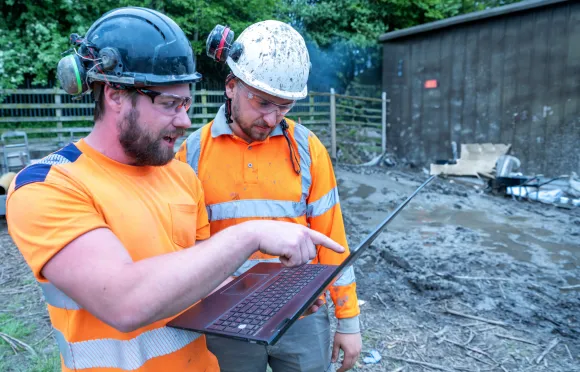
Licencing Applications
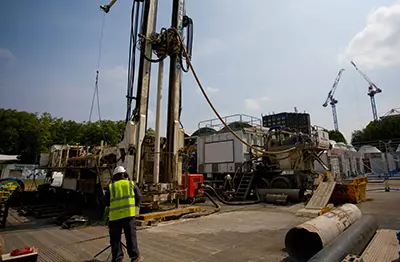
Drilling & Lining
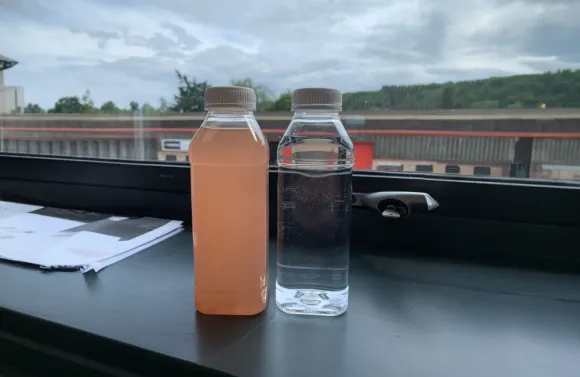
Water Treatment
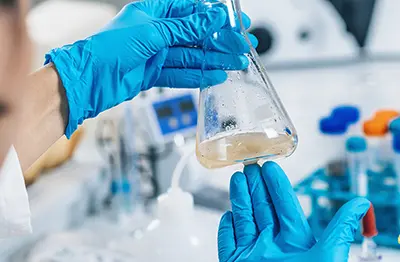
Water Analysis
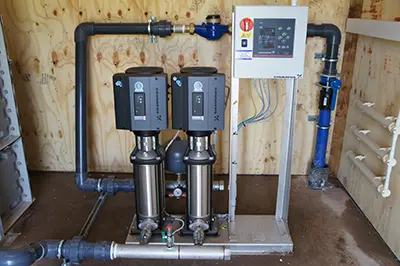
Test Pumping
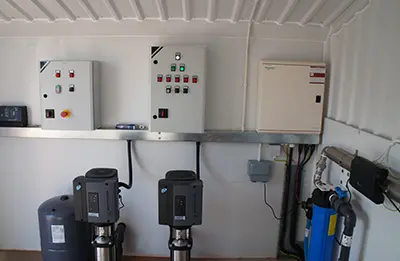
Borehole Pumps

Borehole Design

Abstraction Borehole Real Time Digital Monitoring Systems

Drilling Consultancy

Pump Installation

